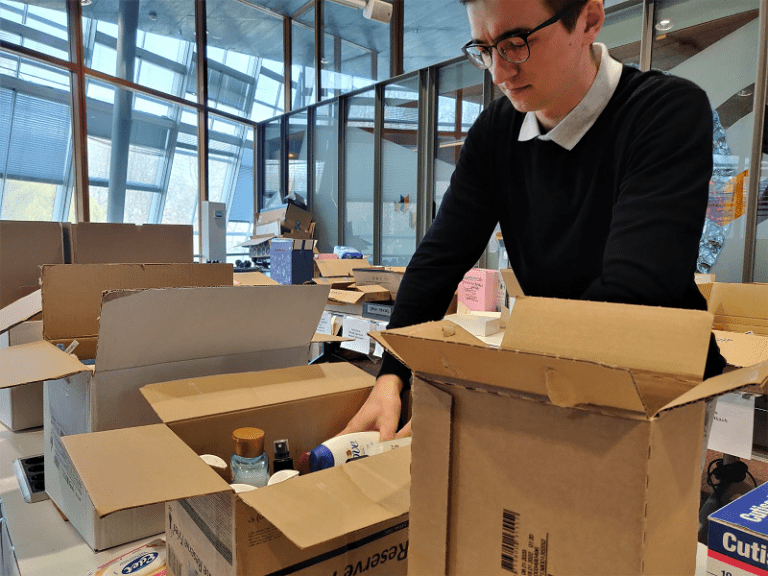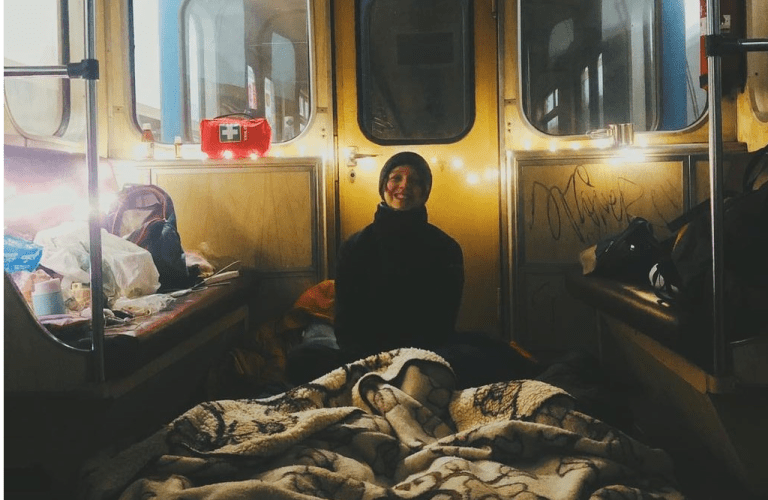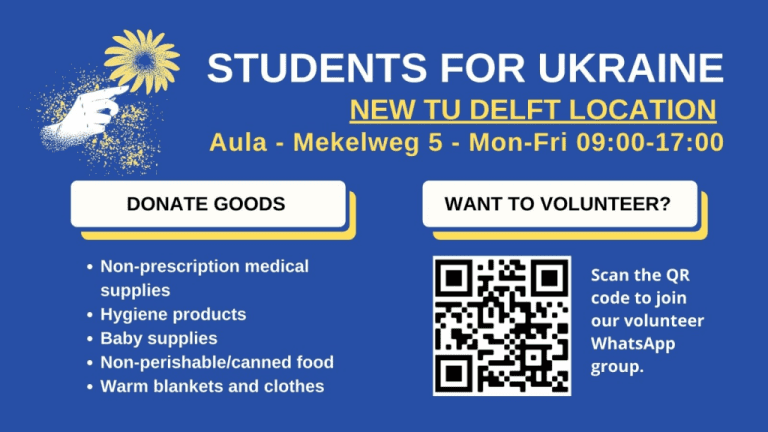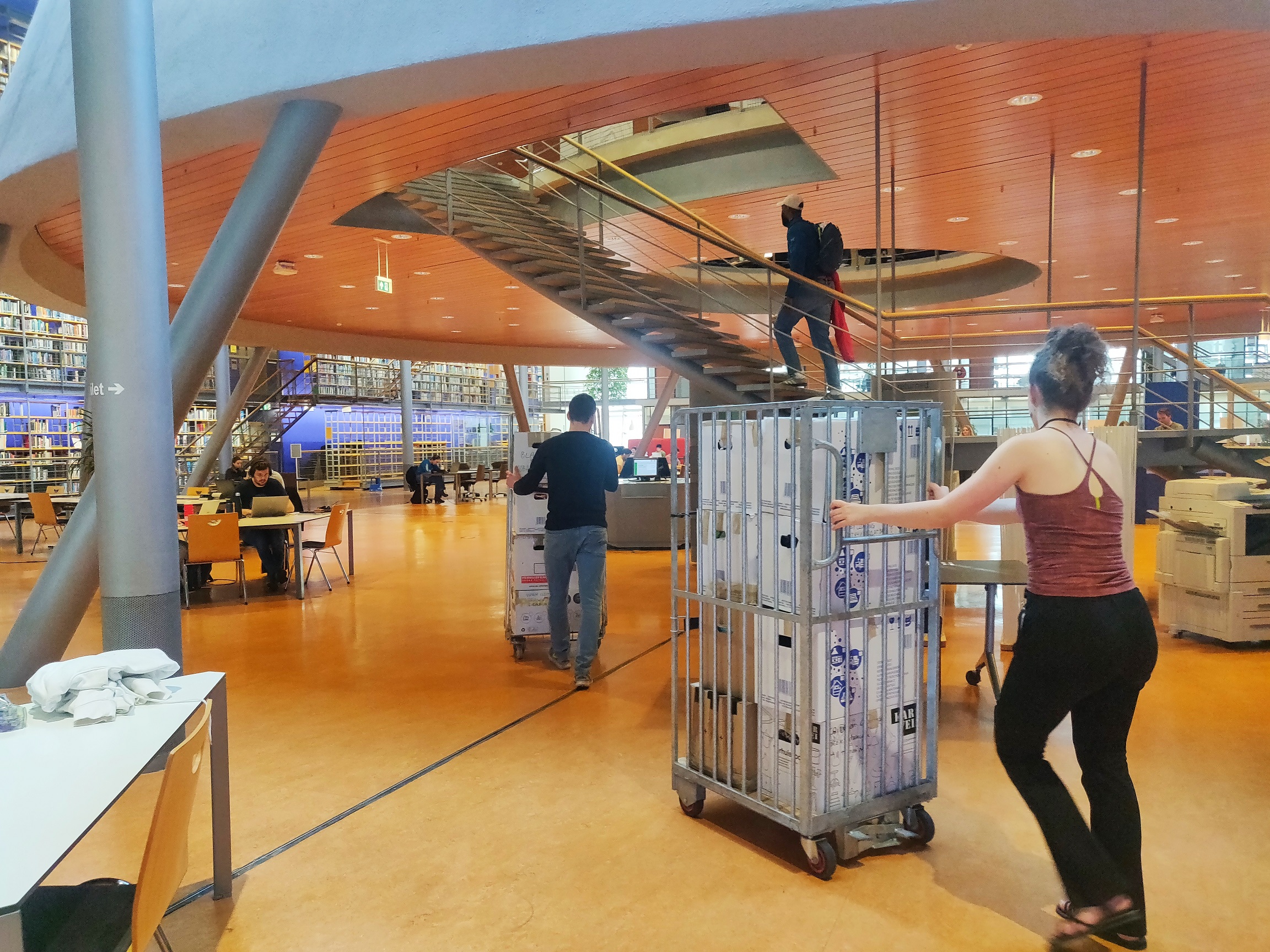After three weeks of collecting goods, Students4Ukraine is continuing their shipments to Ukraine. On Thursday they relocated their TU Delft operation to the Aula.
Volunteers are moving boxes from the TU Library to the new, permanent drop off point at the TU Delft Aula. (Photo: Marjolein van der Veldt)
After almost a month of walking a fine line between order and chaos, the Students4Ukraine initiative has proven to be sustainable. They: moved their TU Delft drop-off point to a permanent location, the TU Delft Aula; solidified the cooperation with Ukraine Emergency Appeal the Netherlands – an independent organisation working for the Red Cross Ukraine – to guarantee regular shipments to Ukraine; opened new drop-off points across the Netherlands and Belgium; and, made sure thousands of boxes with supplies made their way to Ukraine.
Initiator and TU Delft master’s student Tom Drozdowski (Faculty of Technology, Policy and Management) is determined. “We are in it for the long run.”
Thousands of boxes
Starting out with a single drop-off point at the TU Delft Library, the initiative quickly spread across the Netherlands and Belgium. When donations piled up in Leiden, Maastricht and Utrecht, the need for a more centralised operation became apparent. Drozdowski: “That’s when the Ukraine Emergency Appeal the Netherlands allowed us to use their storage facility in Rijswijk. There we sort and label all the boxes that we collect in all our drop-off points.”
They have already collected over 3,000 boxes and made two shipments that were delivered to Ukrainian border areas. “From there they were transferred to smaller trucks and distributed to Ukrainian cities in need. We were also able to send 60 boxes with medication and first aid supplies to Doctors Without Borders. They handed them out to refugees at the borders and to Ukrainian hospitals.”

Tom Drozdowski: “If we can help at least a few people, then that is what must be done.” (Photo: Marjolein van der Veldt)
Despite the huge need for supplies, the frequency of transport is uncertain as they are subject to multiple unpredictable factors. “There has to be a driver available that is officially designated by the Ukrainian Red Cross, and the situation on the border has to be under control,” explains Drozdowski. He emphasises that people have to understand that there is a war going on. “Humanitarian corridors have to be established to allow safe routes for the trucks. There were instances of landmines being placed along the routes and the trucks coming under fire.”
Kyiv metro
Despite these challenging circumstances, Drozdowski is extremely motivated to continue. “Our goal is to set up an organisation that can provide help in the long term. We could then have a genuine impact on the people in need in Ukraine, and create a platform through which people can provide meaningful help. The war has gone on for a month now, and the reality is that aid will be needed for a long, long time. If we can help at least a few people, then that is what must be done.”

Anastasia now lives in the Kyiv metro. She documents what the situation in the city is currently like. (Photo: @sundayriver)
In the long run, Students4Ukraine is looking into other means of providing help. “We can use our established network to connect similar organisations and projects”, explains Drozdowski. “Furthermore, we engage with Ukrainian people both in the Netherlands and in their home country. Anastasia, for example, sends us photographs that show the harsh reality of living in the Kyiv metro.”
Bursts into tears
Over the past month Drozdowski has spoken to many volunteers and people donating supplies. But it was one encounter that made a lasting impression. “As we were waiting outside the Library, a man with two bags and a dog on a leash approached us. He asked for directions to the drop-off point. I asked him how he got to know us, and he told me he had found us online. Then all of a sudden he burst into tears and told me that his wife had died two days ago. The bags held products she bought for herself but didn’t manage to use. He told us she was very emotional about the war and that this was something she would want. I took his bags and told him that anything I’d say would be meaningless, but that I hoped he would find peace. As I took the bags, I realised that all the work we had done, all these volunteers, it was all worth it just for that one moment.”
How can you help?
- Bring your items to the central collection point: the information desk at the TU Delft Aula.
- You are welcome to bring donations every working day from 09:00 to 17:00.
- If you can spare any moving boxes, please bring them as well.
- You can sign up for a shift at the TU Delft collection point, hand out flyers.
- Or simply spread the word amongst your family and friends.

Do you have a question or comment about this article?
m.vanderveldt@tudelft.nl


Comments are closed.